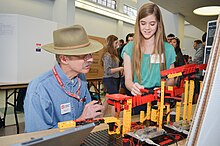
Back STEM Afrikaans العلوم والتكنولوجيا والهندسة والرياضيات Arabic বিজ্ঞান, প্রযুক্তি, প্রকৌশল এবং গণিত Bengali/Bangla STEM Catalan STEM-fag Danish MINT-Fächer German Επιστήμη, Τεχνολογία, Μηχανική και Μαθηματικά Greek STEM Esperanto CTIM Spanish Loodus- ja täppisteadused ning tehnoloogia Estonian

Science, technology, engineering, and mathematics (STEM) is an umbrella term used to group together the distinct but related technical disciplines of science, technology, engineering, and mathematics. The term is typically used in the context of education policy or curriculum choices in schools. It has implications for workforce development, national security concerns (as a shortage of STEM-educated citizens can reduce effectiveness in this area), and immigration policy, with regard to admitting foreign students and tech workers.[1]
There is no universal agreement on which disciplines are included in STEM; in particular, whether or not the science in STEM includes social sciences, such as psychology, sociology, economics, and political science. In the United States, these are typically included by organizations such as the National Science Foundation (NSF),[1] the Department of Labor's O*Net online database for job seekers,[2] and the Department of Homeland Security.[3] In the United Kingdom, the social sciences are categorized separately and are instead grouped with humanities and arts to form another counterpart acronym HASS (humanities, arts, and social sciences), rebranded in 2020 as SHAPE (social sciences, humanities and the arts for people and the economy).[4][5] Some sources also use HEAL (health, education, administration, and literacy) as the counterpart of STEM.[6]
- ^ a b "Science, Technology, Engineering, and Mathematics (STEM) Education: A Primer" (PDF). Fas.org. Archived (PDF) from the original on 2018-10-09. Retrieved 2017-08-21.
- ^ "Research, Development, Design, and Practitioners STEM Occupations". Onetonline.org. 2021-11-16. Archived from the original on 2021-11-16. Retrieved 2021-12-02.
- ^ "Archived copy" (PDF). Archived (PDF) from the original on 2021-08-24. Retrieved 2021-11-16.
{{cite web}}: CS1 maint: archived copy as title (link) - ^ British Academy (2020). "SHAPE". SHAPE. Archived from the original on 25 January 2021. Retrieved 14 January 2021.
- ^ Black, Julia (2 November 2020). "SHAPE – A Focus on the Human World". Social Science Space. Archived from the original on 15 January 2021. Retrieved 14 January 2021.
- ^ Reeves, Richard V. (25 September 2022). "Men can HEAL". ofboysandmen.substack.com. Retrieved 27 January 2023.
© MMXXIII Rich X Search. We shall prevail. All rights reserved. Rich X Search